One of the great institutions of this country, the Foreign Correspondents’ Club of Thailand (FCCT) has a long and fascinating history filled with the exploits of legendary journalists and photographers who risked and even gave their lives to keep the world informed of events in Southeast Asia.
Now in its seventh decade, the club is a magnet for a much wider audience with members from all walks of life enjoying some of the hottest debates in town, presentations, book launches and congenial gatherings. It also continues to play an important role in the quest for freedom of speech and other media issues.
By Dominic Faulder
Now in its seventh decade, the club is a magnet for a much wider audience with members from all walks of life enjoying some of the hottest debates in town, presentations, book launches and congenial gatherings. It also continues to play an important role in the quest for freedom of speech and other media issues.
By Dominic Faulder
The informal origins of the Foreign Correspondents’ Club of Thailand (FCCT) date from the mid-1950s, when a group of correspondents and media types gathered at Mizu’s Kitchen on Patpong Road.
Back then, airlines, trading companies, restaurants and other businesses dominated the area - a far cry from today’s garish and moth-eaten nightlife haunts. Mizu’s survived until very recently with its tablecloths stiffened by the sizzling juices of countless Sarika steaks, and is currently undergoing refurbishment.
The history of the FCCT is the sum of its members – a long list of characters who have played fascinating parts, large and small, in the reporting of Southeast Asia. The FCCT’s principal founder, Jorges Orgibet, rolled up in Thailand with the US Office of War Information at the end of World War II and set up the US Information Service (USIS) office. A journeyman journalist and public relations man who in 1953 served as the first bureau chief for the Associated Press (AP), Orgibet never left. He passed away in 1986 at the Bangkok Nursing Home.
Alex Wu, a Chinese-language editor with USIS, and Prasong Wittaya of United Press, who served several terms as the club’s president, also played key roles.
Alexander MacDonald, the station chief after the war of the US Office of Strategic Services, the forerunner of the Central Intelligence Agency, founded the Bangkok Post in 1946. However, he was chased out of Thailand by 1955 before the FCCT really got going.
Back then, airlines, trading companies, restaurants and other businesses dominated the area - a far cry from today’s garish and moth-eaten nightlife haunts. Mizu’s survived until very recently with its tablecloths stiffened by the sizzling juices of countless Sarika steaks, and is currently undergoing refurbishment.
The history of the FCCT is the sum of its members – a long list of characters who have played fascinating parts, large and small, in the reporting of Southeast Asia. The FCCT’s principal founder, Jorges Orgibet, rolled up in Thailand with the US Office of War Information at the end of World War II and set up the US Information Service (USIS) office. A journeyman journalist and public relations man who in 1953 served as the first bureau chief for the Associated Press (AP), Orgibet never left. He passed away in 1986 at the Bangkok Nursing Home.
Alex Wu, a Chinese-language editor with USIS, and Prasong Wittaya of United Press, who served several terms as the club’s president, also played key roles.
Alexander MacDonald, the station chief after the war of the US Office of Strategic Services, the forerunner of the Central Intelligence Agency, founded the Bangkok Post in 1946. However, he was chased out of Thailand by 1955 before the FCCT really got going.
| Darrel Berrigan, the founder of the Bangkok World, a competing English-language newspaper in the late 1950s, played a bigger role. Berrigan also had a wartime intelligence background and was well connected in influential Thai circles, having worked with the Free Thai movement, Thailand’s wartime anti-Japanese maquis. Berrigan filed for US papers, including The New York Times, and was president in 1957. He was murdered in October, 1965, apparently the victim of a homosexual tryst that went wrong. The Oriental, a historic riverside hotel, was somewhere everyone passed through – Somerset Maugham, Eleanor Roosevelt, Gore Vidal, Jackie Kennedy, James Michener, Grace Kelly, Peter Ustinov, and half the world’s royalty. In the 1970s, it also provided the FCCT with its most glamorous setting, and the location helped make the club part of the city’s expatriate hub. The mostly undistinguished correspondents of the day basked in the hotel’s reflected glory. After all, except for the occasional half-baked military coup or unexplained death (including that of King Ananda Mahidol in 1946), Thailand itself seldom amounted to much of a story. On one celebrated occasion in 1971, Foreign Minister Thanat Khoman was addressing correspondents at the club when a call came through informing him that Field Marshal Thanom Kittikachorn, the prime minister, had just staged a coup against his own government. Thanat announced the putsch and continued urbanely, unaware that his was one of the guillotined cabinet heads. |
| Bangkok remained a media backwater throughout the growing US military presence from the late 1950s and into the core Vietnam War years; Hong Kong played a much bigger supporting role for international media operating in Indochina. This all changed in mid-1975 when Phnom Penh, Saigon, and Vientiane fell to communist forces in quick succession. Many evacuated bureaus were transplanted to Bangkok, which became the watchtower for Indochina and closeted Burma (Myanmar today), playing much the same role as Hong Kong did for China-watchers after the communist takeover in 1949. Ironically, it was the end of the Vietnam War that really filled the club with war correspondents, giving it a new edge and confirming it as the largest press club in Southeast Asia, which it remains. After the Khmer Rouge wiped out his Phnom Penh bureau, Denis Gray began the longest stint anywhere as an AP bureau chief in Bangkok, running well over 30 years. Gray, who now lives in Chiang Mai, served as club president on three occasions and, as all presidents do, doubled his day job with no added pay. The legendary Australian cameraman Neil Davis was one of the great Indochina correspondents to take up residence in Bangkok, and was president in 1981. Immensely popular and widely respected, Davis and his soundman, American Bill Latch, were killed by wild gunfire from tanks during an attempted coup on September 9, 1985. |
No one was ever charged in their killings, and there was international outrage that something so minor should have claimed their lives. The club was split as never before – or since – over how to respond to the tragedy, the 35th anniversary of which will be marked next year.
Surviving friends of Davis and Latch include Indochina veterans Derek Williams, who was with CBS News and then AsiaWorks, and James Pringle, formerly with Reuters and Newsweek. Another close friend, John McBeth of the old Far Eastern Economic Review visits the club whenever he is in town from Bali, where he retired with his wife Yuli Ismartono, another old FCCT president when she was correspondent for Jakarta’s Tempo magazine.
Surviving friends of Davis and Latch include Indochina veterans Derek Williams, who was with CBS News and then AsiaWorks, and James Pringle, formerly with Reuters and Newsweek. Another close friend, John McBeth of the old Far Eastern Economic Review visits the club whenever he is in town from Bali, where he retired with his wife Yuli Ismartono, another old FCCT president when she was correspondent for Jakarta’s Tempo magazine.
Itinerant club
After The Oriental, the FCCT sought a roof of its own, moving through a succession of premises, mostly hotels, all of which had drawbacks. In 1981, the club was located in The Oriental Plaza, a charming Thai ‘colonial’ building resting on traditional solid teak piles. It was near The Oriental and the Chao Phraya river once more – but this time without a view. Located far from any news bureaus, the club was on the wrong side of Bangkok’s diabolical traffic, and attendance suffered.
In 1984, the FCCT relocated to an eyrie atop The Dusit Thani, one of Bangkok’s leading hotels, with a breathtaking city view across Lumpini Park. Unfortunately, many correspondents were loath to traipse through a five-star hotel lobby to reach the club, particularly with so many other more diverting watering holes available nearby.
During the giddy, greedy 1990s, the hotel’s management imagined it could use the clubhouse - a firetrap with access only by a single wooden staircase - more lucratively as a function room. The club balked at paying higher rates and moved out. If the old clubhouse, which had hosted Robin Williams, Khieu Samphan, William Golding, and the Dalai Lama, among many, was haunted by any of the great personalities who visited, only the janitors of the storeroom it became would know. The venerable hotel is currently being demolished.
In 1995, the club moved for a while down to the bottom of Silom Road, the supposed Wall Street of Bangkok, to the Jewelry Trade Center, which its developers hoped to establish as a media building. That did not happen, and once again the location near the river dented patronage badly.
After The Oriental, the FCCT sought a roof of its own, moving through a succession of premises, mostly hotels, all of which had drawbacks. In 1981, the club was located in The Oriental Plaza, a charming Thai ‘colonial’ building resting on traditional solid teak piles. It was near The Oriental and the Chao Phraya river once more – but this time without a view. Located far from any news bureaus, the club was on the wrong side of Bangkok’s diabolical traffic, and attendance suffered.
In 1984, the FCCT relocated to an eyrie atop The Dusit Thani, one of Bangkok’s leading hotels, with a breathtaking city view across Lumpini Park. Unfortunately, many correspondents were loath to traipse through a five-star hotel lobby to reach the club, particularly with so many other more diverting watering holes available nearby.
During the giddy, greedy 1990s, the hotel’s management imagined it could use the clubhouse - a firetrap with access only by a single wooden staircase - more lucratively as a function room. The club balked at paying higher rates and moved out. If the old clubhouse, which had hosted Robin Williams, Khieu Samphan, William Golding, and the Dalai Lama, among many, was haunted by any of the great personalities who visited, only the janitors of the storeroom it became would know. The venerable hotel is currently being demolished.
In 1995, the club moved for a while down to the bottom of Silom Road, the supposed Wall Street of Bangkok, to the Jewelry Trade Center, which its developers hoped to establish as a media building. That did not happen, and once again the location near the river dented patronage badly.
Staying relevant, treading carefully
In 1997, the Thai economy crashed and over 50 financial companies were put out of business permanently by fierce International Monetary Fund rescue strictures. With the country in hock, rents in prime locations also crashed. The Maneeya Center near the Rajaprasong intersection, home to the famous Erawan Shrine and the longest traffic light in the world, suddenly found itself with acres of empty floorspace.
The FCCT moved into the penthouse floor with access from a corridor already filling up with foreign media offices. The Maneeya today houses AsiaWorks, the BBC, InFocus, Al Jazeera, and the Financial Times, among others. This guarantees the FCCT constant journalist traffic, imbuing it with the main ingredient for a genuine press club. It has a good bar and recently upgraded menu. It is the perfect place to meet for quiet lunches in airconditioned comfort or outside on the recently refurbished veranda.
FCCT membership is about 700, over a tenth of whom are accredited correspondents, an endangered species these days. Apart from those working for wire services, the number of fully employed and decently remunerated correspondents can be counted on two hands.
But Thailand also has a large journalist community composed of freelancers and others working for local media organizations. When combined, the professional component of the club’s membership is almost one-fifth – probably higher than in most press clubs. But it has been declining. Between 2007 and 2011, the combined total fell most dramatically from 233 to 184, but has since levelled out.
The club has regular photojournalism exhibitions, and has a number of regional media education funds. It has supported the publication and distribution of highly regarded journalism manuals in the regional vernaculars. It is heavily used for book launches and press conferences.
In 1997, the Thai economy crashed and over 50 financial companies were put out of business permanently by fierce International Monetary Fund rescue strictures. With the country in hock, rents in prime locations also crashed. The Maneeya Center near the Rajaprasong intersection, home to the famous Erawan Shrine and the longest traffic light in the world, suddenly found itself with acres of empty floorspace.
The FCCT moved into the penthouse floor with access from a corridor already filling up with foreign media offices. The Maneeya today houses AsiaWorks, the BBC, InFocus, Al Jazeera, and the Financial Times, among others. This guarantees the FCCT constant journalist traffic, imbuing it with the main ingredient for a genuine press club. It has a good bar and recently upgraded menu. It is the perfect place to meet for quiet lunches in airconditioned comfort or outside on the recently refurbished veranda.
FCCT membership is about 700, over a tenth of whom are accredited correspondents, an endangered species these days. Apart from those working for wire services, the number of fully employed and decently remunerated correspondents can be counted on two hands.
But Thailand also has a large journalist community composed of freelancers and others working for local media organizations. When combined, the professional component of the club’s membership is almost one-fifth – probably higher than in most press clubs. But it has been declining. Between 2007 and 2011, the combined total fell most dramatically from 233 to 184, but has since levelled out.
The club has regular photojournalism exhibitions, and has a number of regional media education funds. It has supported the publication and distribution of highly regarded journalism manuals in the regional vernaculars. It is heavily used for book launches and press conferences.
| Monday nights are for documentaries when work is shown that might not normally find a screen in Bangkok. The FCCT has welcomed most Thai prime ministers since the 1970s to give high-profile keynote addresses. The club’s flagship event, however, has long been its Wednesday night programmes when panellists set forth on issues of topical interest and both sides of the coin are seen. The clubhouse can overflow when major topics are addressed; for example, the frustrated new generation of politicians or the infamous TM30 immigration reporting requirement. As anyone who was watched Bangkok’s parliament in session will know, debating seldom amounts to much, and this shortcoming has contributed to the exceptionally vicious and polarized national politics seen over the past decade. This means the FCCT has always had a useful role to play as a neutral outside forum. Sadly, with street politics occasionally right on its doorstep, it has sometimes been hard to guarantee the safety of speakers. The club is routinely accused of being red by those on the yellow side of politics, and yellow by those on the red side, so it is probably doing something right. |
The FCCT regularly speaks out on press and freedom of speech issues. This can make life uncomfortable under a prickly regime in a culture sometimes unable to differentiate critique from criticism. Indeed, Thailand has been marching backwards through all the freedom indexes lately, and a number of FCCT events have been shut down by the authorities.
The club has done what it can to help correspondents and journalists who fall foul of Thailand’s defamation laws, but a few have nevertheless been forced out of the country. The oppressive local legal restraints include the infamous law of lèse-majesté. It is intended to protect the monarchy from hurt, but survives in a uniquely extreme form that perversely has done much damage to the institution. There have been signs in recent years, however, that its use is finally being curbed.
Lese-majeste, defamation, sedition and libel are punished as criminal offences. In 2009, a vexatious complaint of lèse-majesté was lodged against the entire 13-member board at a local police station, but went nowhere. A former FCCT president, BBC correspondent Jonathan Head, has in the past been the target of lèse-majesté complaints, though thousands of such complaints have been made against ordinary Thais with much more serious consequences.
The club has done what it can to help correspondents and journalists who fall foul of Thailand’s defamation laws, but a few have nevertheless been forced out of the country. The oppressive local legal restraints include the infamous law of lèse-majesté. It is intended to protect the monarchy from hurt, but survives in a uniquely extreme form that perversely has done much damage to the institution. There have been signs in recent years, however, that its use is finally being curbed.
Lese-majeste, defamation, sedition and libel are punished as criminal offences. In 2009, a vexatious complaint of lèse-majesté was lodged against the entire 13-member board at a local police station, but went nowhere. A former FCCT president, BBC correspondent Jonathan Head, has in the past been the target of lèse-majesté complaints, though thousands of such complaints have been made against ordinary Thais with much more serious consequences.
| Soon after the coup of 22 May 2014, the ousted education minister, Chaturon Chaisaeng, requested a press conference at the FCCT to surrender himself to military authorities. He was arrested by helmeted soldiers in a media blaze soon after concluding his talk. Three weeks later, Deputy Army Spokesman Colonel Weerachon Sukhondhapatipak was sitting in the exact same place explaining the military’s perspective. The FCCT wouldn’t have it any other way. Dominic Faulder served as FCCT president in 1990-1 and 2016-8 Parts of this article first appeared in April 2015 in Number 1 Shimbun, the club magazine of the Foreign Correspondents’ Club of Japan. |

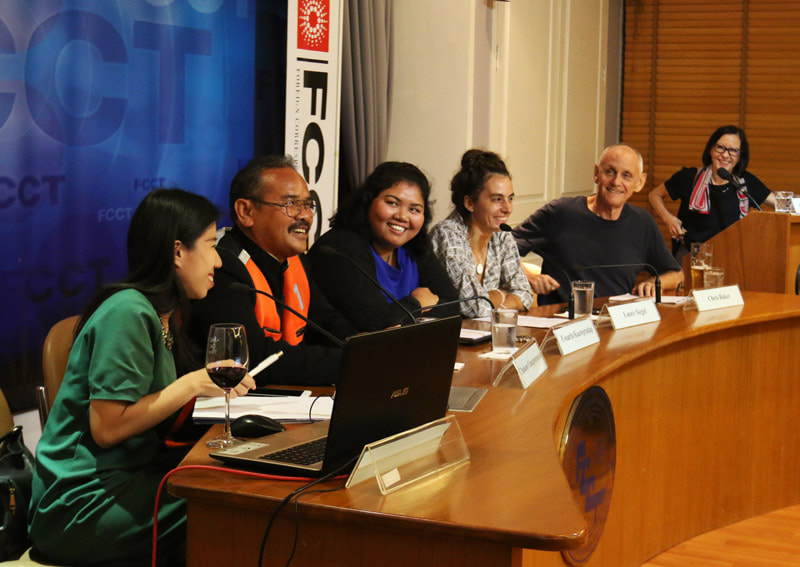
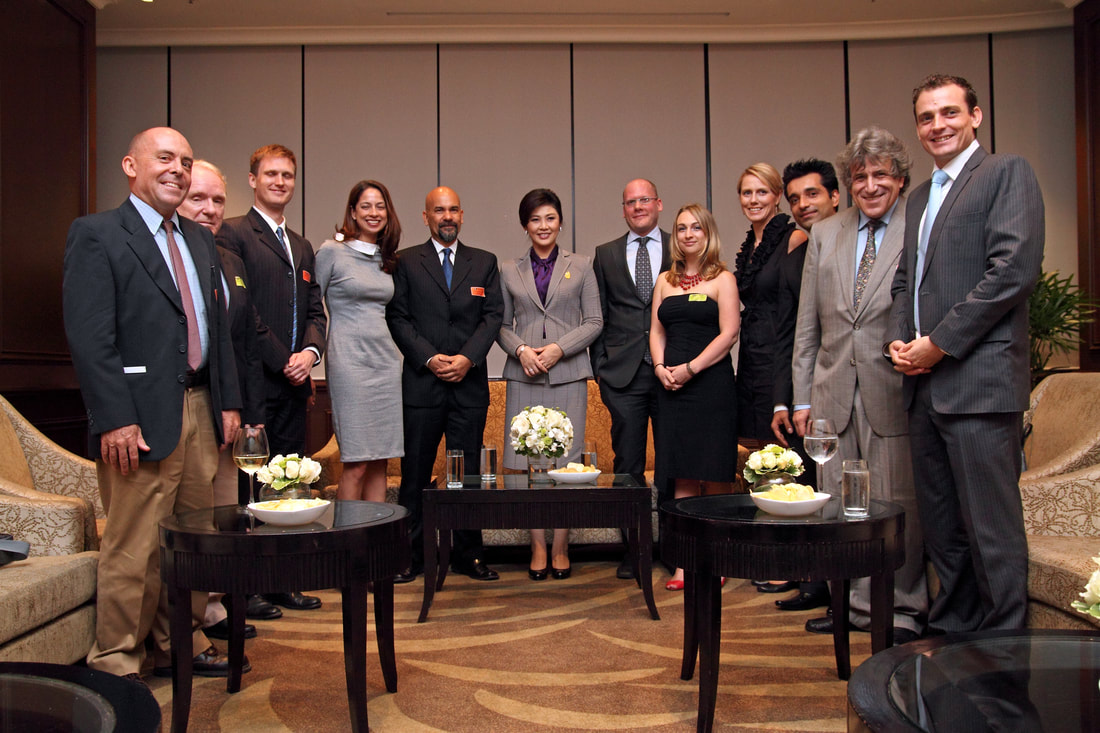
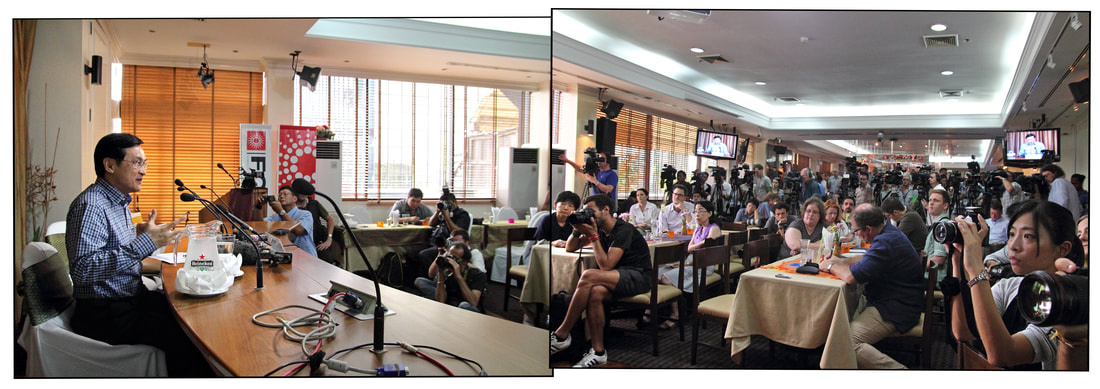
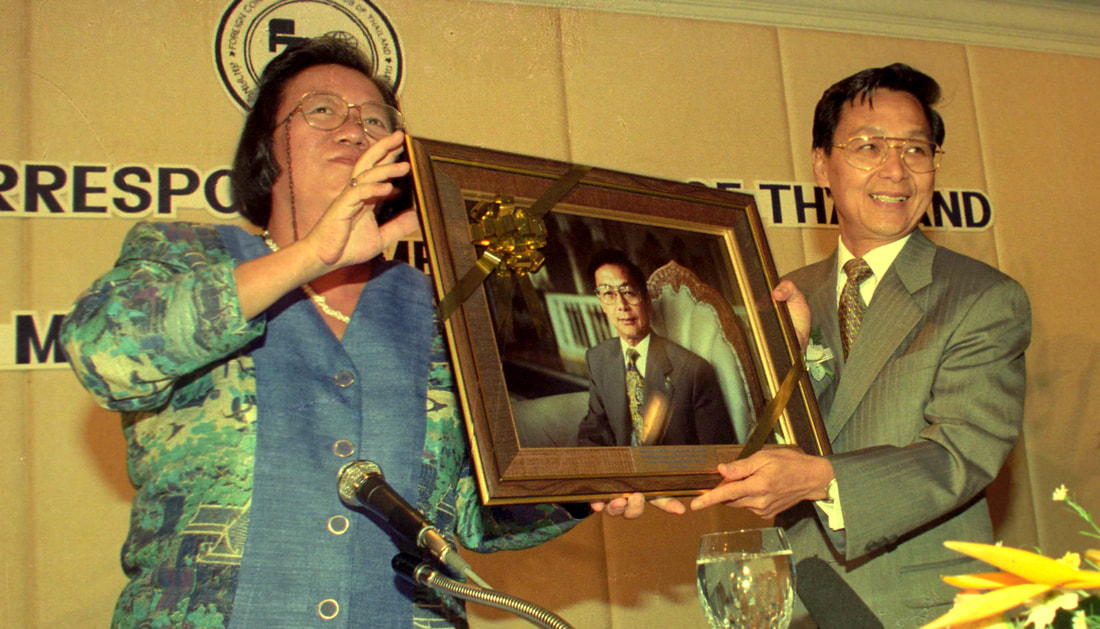
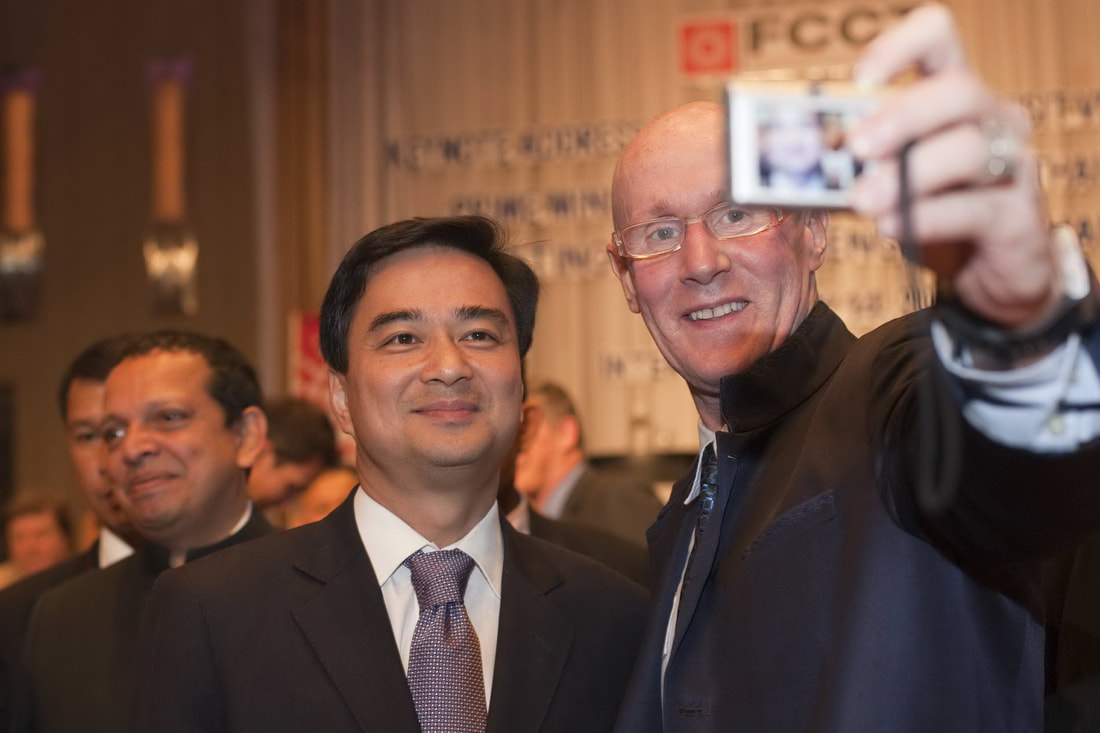
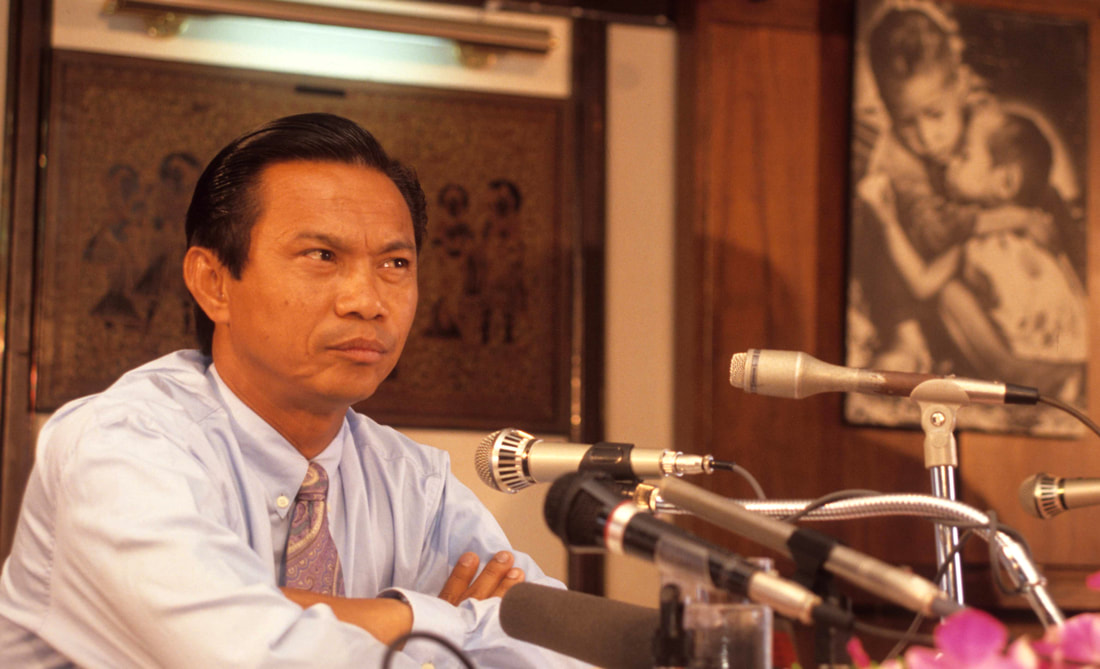
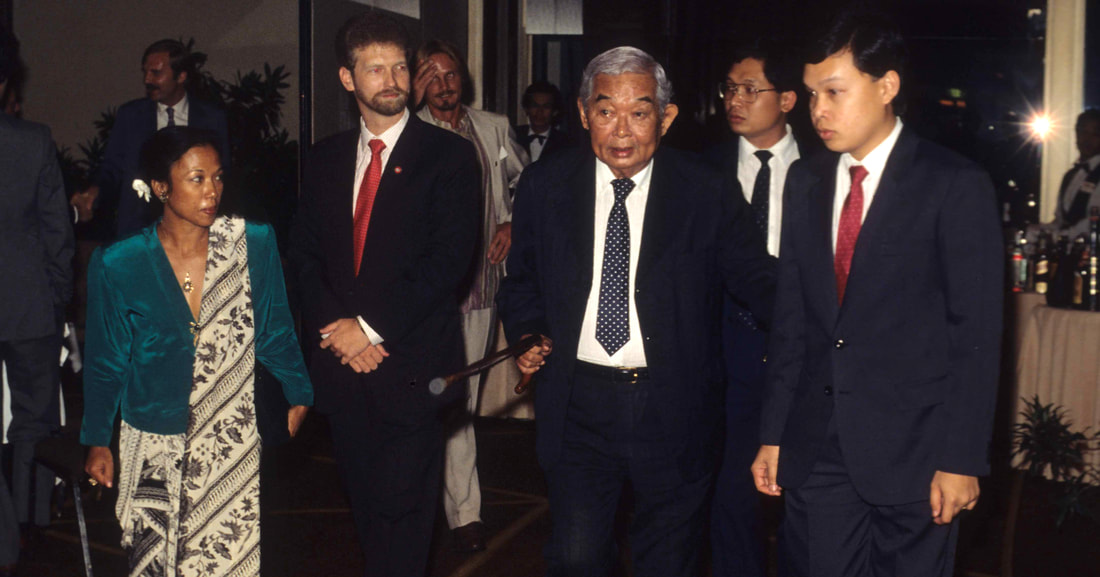
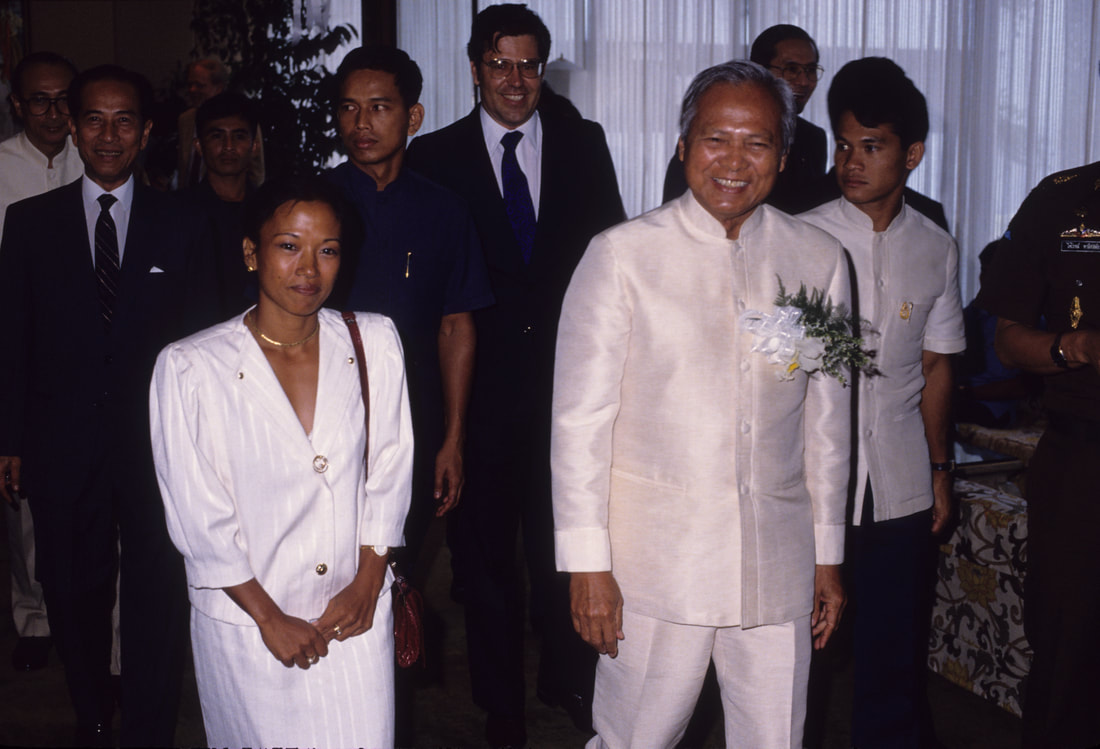
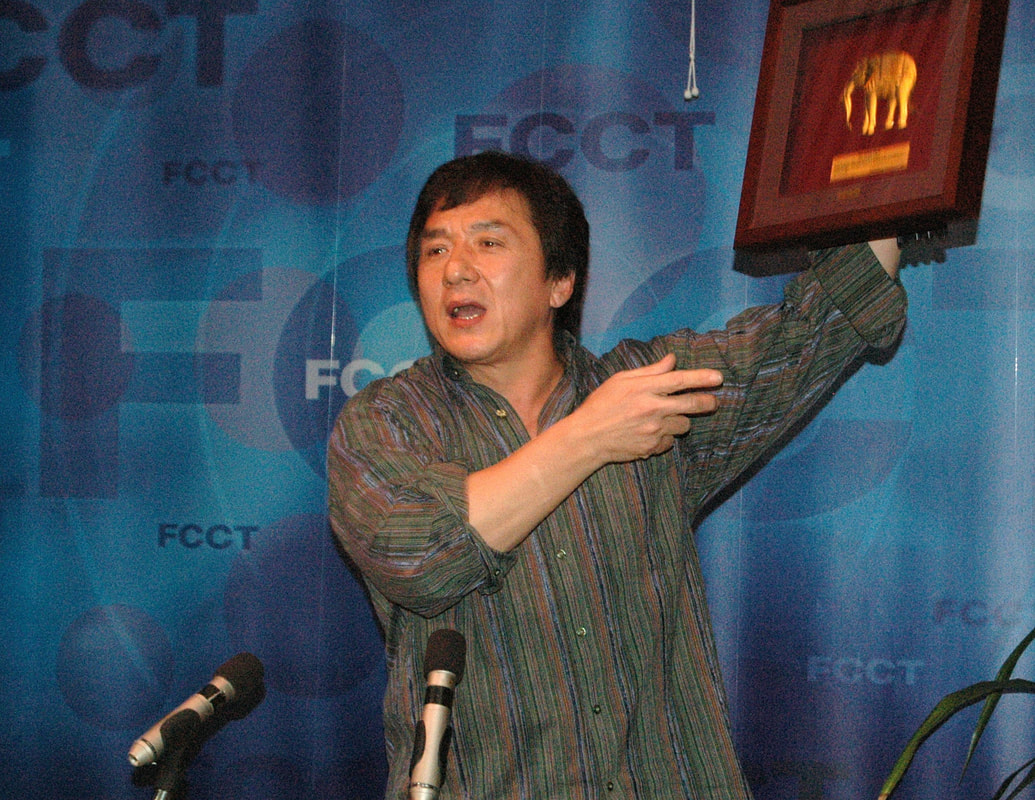
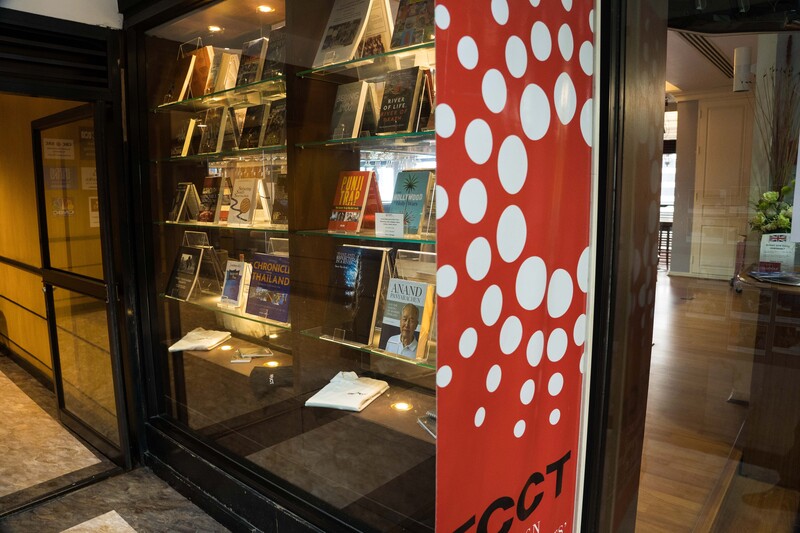
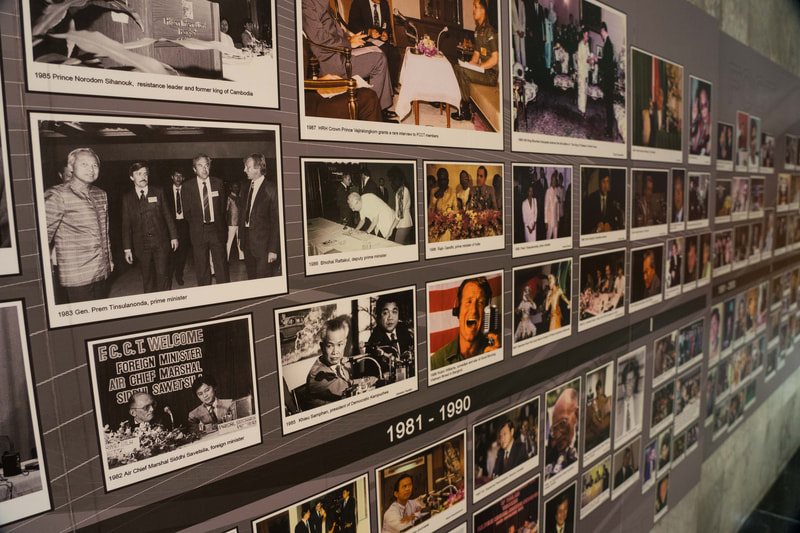
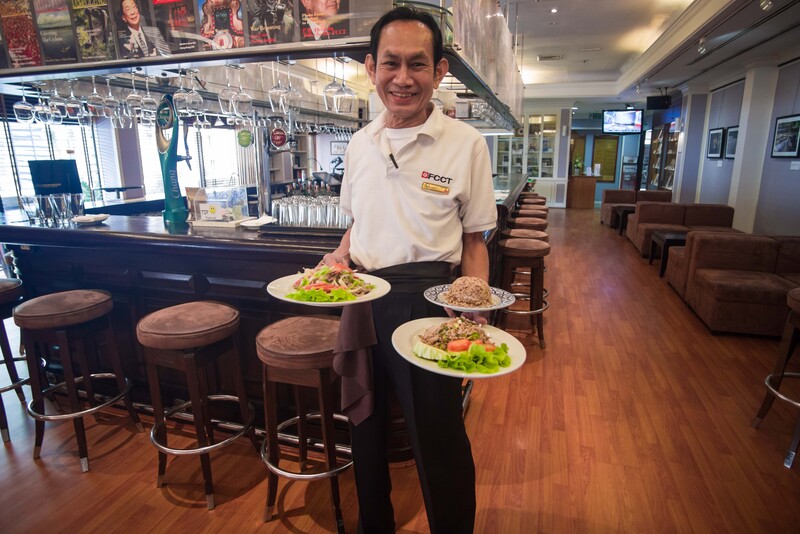
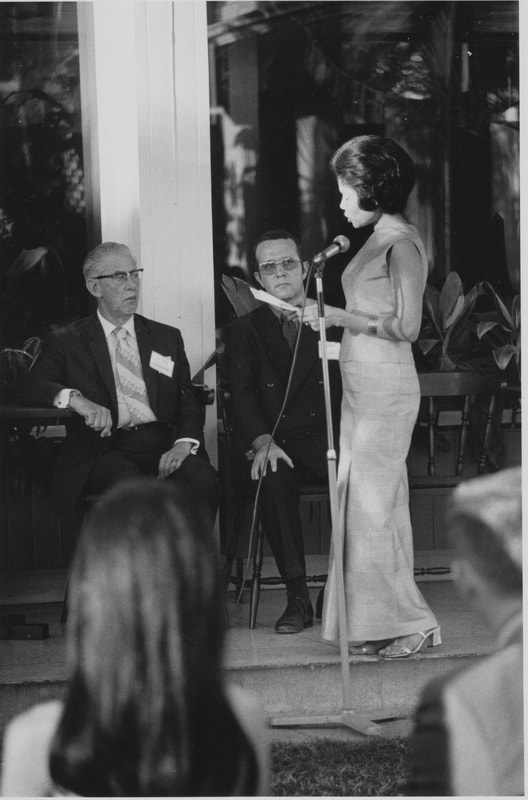
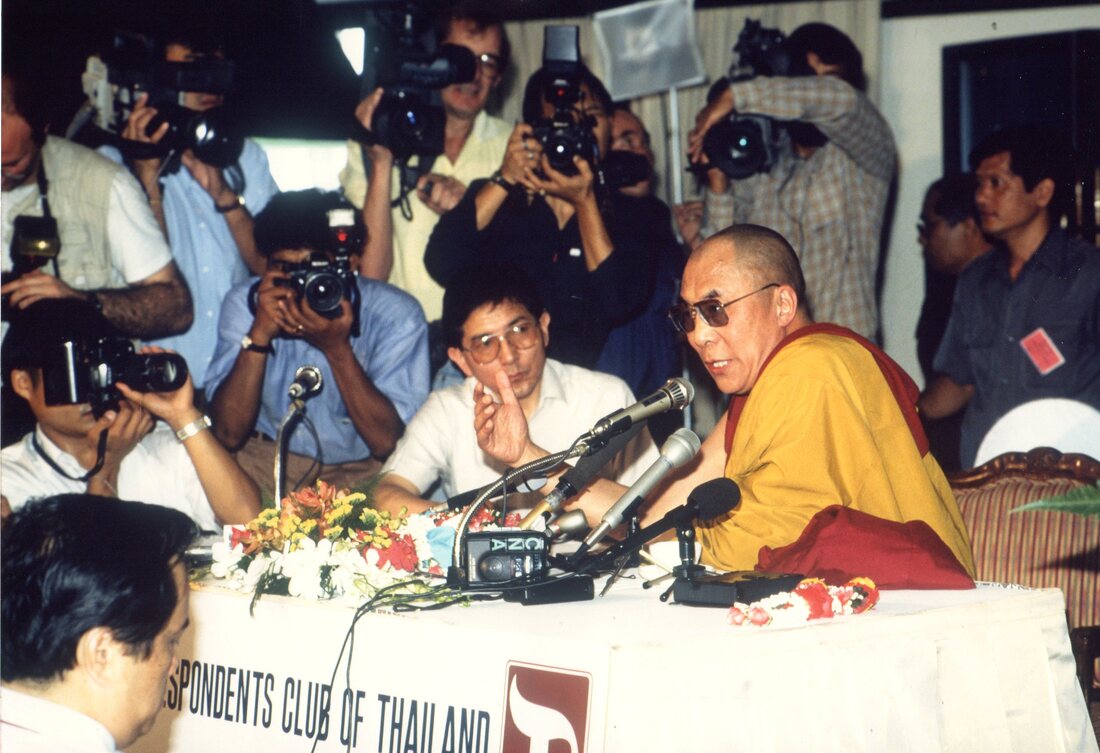
 RSS Feed
RSS Feed
















